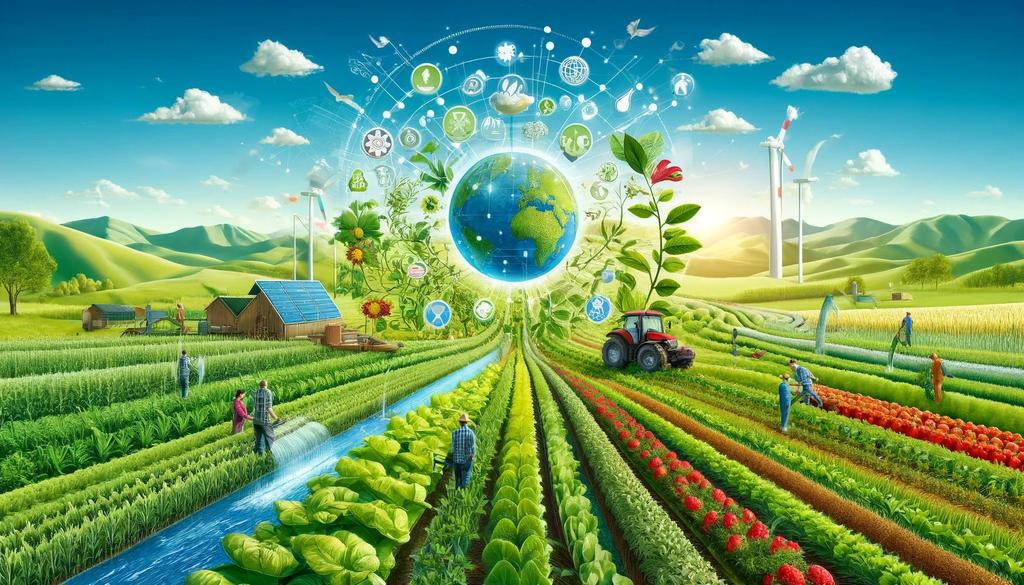As the world grapples with the challenges of climate change, environmental degradation, and food insecurity, sustainable agriculture practices have become more crucial than ever before. With the global population projected to reach 9.7 billion by 2050, the need for sustainable agricultural practices that prioritise environmental stewardship, social equity, and economic viability, has never been more pressing.
Moving forward, we will explore the key sustainable agriculture practices that will shape the future of farming in 2025 and beyond. We will delve into the principles of sustainable agriculture, discuss the benefits and challenges of adopting these practices, and highlight innovative solutions that are transforming the agricultural landscape.
Principles of sustainable agriculture
Sustainable agriculture is an approach to farming that prioritises the long-term health and productivity of the land, as well as the well-being of the people and communities involved in farming. The core principles of sustainable agriculture include:
- Environmental stewardship: Sustainable agriculture practices aim to conserve and enhance natural resources, such as soil, water, and biodiversity.
- Social equity: Sustainable agriculture prioritises fair labour practices, equitable access to resources, and the empowerment of marginalised communities.
- Economic viability: Sustainable agriculture seeks to promote economically-viable farming practices that ensure the long-term profitability and resilience of farms.

Sustainable agriculture practices for 2025
So, what are the key sustainable agriculture practices that will shape the future of farming in 2025? Here are some of the most promising approaches:
- Regenerative agriculture: Regenerative agriculture is a holistic approach to farming that seeks to regenerate soil health, biodiversity, and ecosystem services. This approach involves practices such as no-till or reduced-till farming, cover cropping, and integrating livestock grazing.
- Agroforestry: Agroforestry is the practice of integrating trees into farming systems to promote ecological interactions and synergies. This approach can help to enhance biodiversity, improve soil health, and reduce greenhouse gas emissions.
- Organic farming: Organic farming is a production system that avoids the use of synthetic fertilizers, pesticides, and genetically modified organisms (GMOs). Organic farming promotes soil health, biodiversity, and ecosystem services, while also reducing the environmental impact of farming.
- Precision agriculture: Precision agriculture is an approach to farming that uses advanced technologies, such as drones, satellite imaging, and precision irrigation, to optimise crop yields, reduce waste, and promote environmental sustainability.
- Climate-smart agriculture: Climate-smart agriculture is a system of farming that seeks to enhance the resilience of agricultural systems to climate change. This approach involves practices such as agroforestry, conservation agriculture, and climate-resilient crop and animal varieties.
Benefits of sustainable agriculture practices
The benefits of sustainable agriculture practices are numerous and well-documented. Some of the key advantages include:
- Improved environmental outcomes: Sustainable agriculture practices can help to reduce greenhouse gas emissions, conserve water, and promote biodiversity.
- Enhanced food security: Sustainable agriculture practices can help to improve crop yields, reduce post-harvest losses, and promote access to nutritious food.
- Increased farmer resilience: Sustainable agriculture practices can help to enhance the resilience of farmers to climate change, market fluctuations, and other shocks.
- Better livelihoods: Sustainable agriculture practices can promote better livelihoods for farmers and rural communities, through improved incomes, employment opportunities, and social services.
Challenges and opportunities
While sustainable agriculture practices offer many benefits, there are also challenges and opportunities to consider. Some of the key challenges include:
- Higher upfront costs: Sustainable agriculture practices can require higher upfront costs, such as investments in new technologies or equipment.
- Limited access to markets: Sustainable agriculture practices can require access to specialised markets, which can be limited in some regions.
- Climate change: Climate change poses significant challenges to sustainable agriculture practices, through increased temperatures, changing precipitation patterns, and increased frequency of extreme weather events.
Despite these challenges, there are many opportunities to promote sustainable agriculture practices, including:
- Government policies and incentives: Governments can play a critical role in promoting sustainable agriculture practices, through policies and incentives that support environmentally-friendly farming practices.
- Private sector investment: The private sector can also play a critical role in promoting sustainable agriculture practices, through investments in sustainable agriculture technologies, equipment, and training programmes.
- Civil society engagement: Civil society organisations can help to promote sustainable agriculture practices, through advocacy, education, and community outreach programmes.
Conclusion
Sustainable agriculture practices are critical for promoting environmental stewardship, social equity, and economic viability in the agriculture sector. As we look into the future, it is clear that sustainable agriculture practices will certainly play an increasingly important role in promoting food security, reducing poverty, and mitigating the impacts of climate change.



